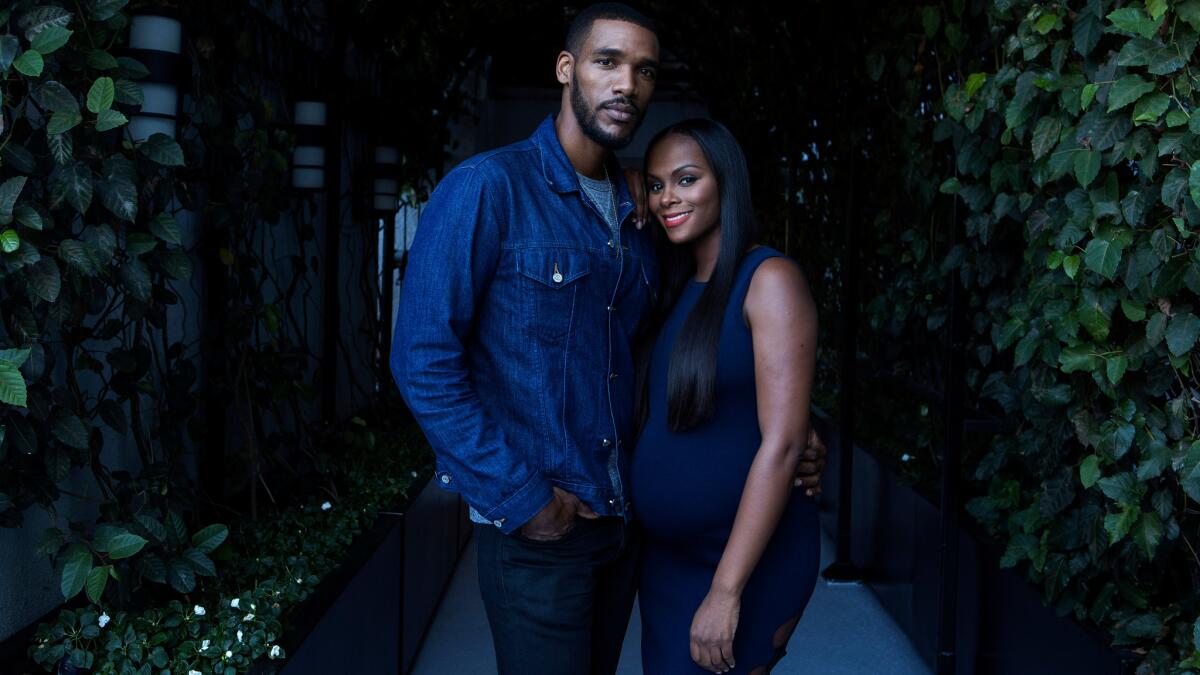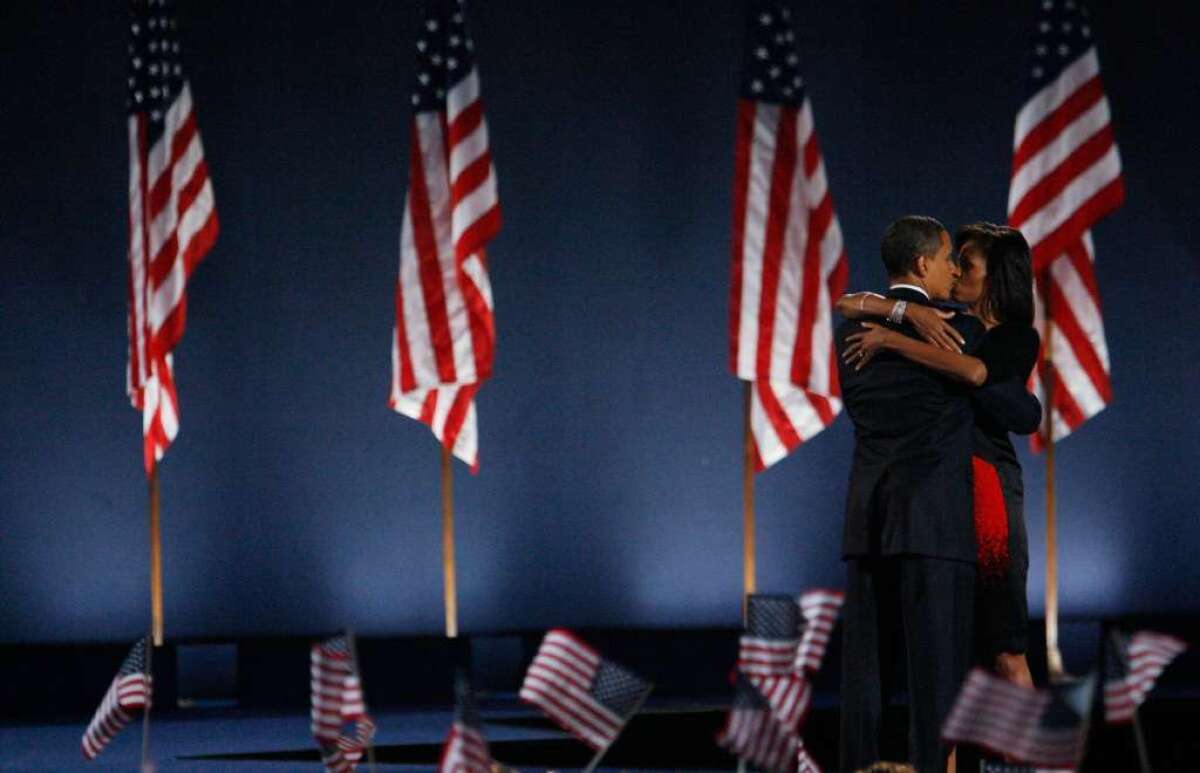How the love African Americans have for the Obamas emboldens ‘Southside With You’

Parker Sawyers plays Barack Obama and Tika Sumpter plays Michelle Robinson in “Southside With You.”
- Share via
When President Obama was first elected on the night of Nov. 4, 2008, and took the stage in Grant Park in his hometown of Chicago, black people saw what all of America and the world saw. But what many of them felt was very different. Though the words “pride” and “respect” may come to mind, ultimately, what landed the first black First Family a spot on the walls of black households where portraits of only Martin Luther King Jr. hang was their evident, unmitigated love. That same pride, respect and love has persisted throughout the Obamas’ eight years in office, and it’s what drives “Southside With You,” the film about the couple’s first date, in theaters Friday.
“When it first came out that we were doing the movie, it was kind of under the radar. It was like ‘that could be cute,’” said actor Tika Sumpter, mimicking potentially judgmental moviegoers. “But I know how much especially black people love the Obamas, and especially Michelle Obama. So I knew that I had to get it right.”
“Southside With You” is a look at the start of Barack and Michelle’s relationship, when her last name was Robinson and she was his boss at a local law firm. In the film, Barack, played by Parker Sawyers (“Zero Dark Thirty,” “Survivor”), asks Sumpter’s Michelle to accompany him to a community meeting. He however swindles her into a daylong date, detouring to a museum and a park, catching Spike Lee’s “Do The Right Thing” at the movies and grabbing ice cream before the night ends.

Review: ‘Southside With You’ drops in on the cute beginning of a beautiful Obama partnership »
Executive produced by John Legend, the film is written and directed by first-time filmmaker Richard Tanne, who can remember the first time he thought the nexus of the Obama’s love would make a great film.
“The way they embraced each other at their victory speech in 2008, seeing them in that moment with thousands of people around them and yet, there was this really palpable privacy and intimacy between just the two of them,” he said. “You can’t fake that.”
After hearing through a friend that Tanne wanted to do this film, Sumpter (“The Haves and the Have Nots,” “Sparkle”) arranged to meet him. Though she was initially interested in playing the role of Michelle, she settled on being a producer and helping the film come to life. But after reading the script, which Tanne said he wrote with Sumpter in mind, she knew the role had to be hers.
“It wasn’t until Tika read the outline and I saw how it affected her, that it hit me on a deeper level that this wouldn’t be just a clever, fun movie to make,” Tanne said. “That there is a deeper meaning for a lot of people out there.”
That conversation prompted Tanne, who is white, to get in touch with his “inner blackness” and “open the doors of empathy,” he said, to ensure this story was authentic and best pays homage to the unique admiration black people have for Barack and Michelle.
“I fell in love with them the way the rest of the country did. But, on inauguration day and election night, seeing the African American faces in that crowd … and seeing what it did [to black people], for me, it was impossible not to feel that,” he said.
It was always going to be about the embodiment of the essence, not the imitation.
— Tika Sumpter, on playing Michelle Obama
As Sawyers termed it, the election of Obama instilled in black people a unique pride “because we knew we could do it … and now, we’ve had somebody do it. And it’s like, ‘Of course, because we knew this.’”
That same pride could be felt earlier this year when both Barack and Michelle Obama spoke to a packed Democratic National Convention in Philadelphia, their last time doing so as president and first lady. As the most elegant power couple in a town filled with them, each took the stage commanding attention, evoking compassion, grace, warmth and love, embodying the rarity of their places in history.
As the Obamas prepare to leave the White House, Sumpter and Parker have had the greatest of teachers in how to accurately portray their roles, the president and first lady themselves, who have emerged as entertainment savvy pop icons — championing “Hamilton,” appearing on Web shows including “Between Two Ferns” and “Comedians in Cars Getting Coffee,” slow-jamming the news with Jimmy Fallon and carpool karaoke-ing with James Corden — in the way few politicians before them ever could. But because they had no access to the purveyors of the Oval Office, Tanne wrote the script “separate from the politics of today and how we perceive them on the TV every night or when we read about them in the paper.”
The characters Sumpter and Parker play are not “The Obamas,” but rather Barry Obama and Michelle Robinson. Either way, there were some character traits the two actors had to perfect lest black audiences and Black Twitter, Sumpter said, see through the performance, “see it ain’t real and tear it down.”

“For me it was about hitting her speech patterns and the way she enunciates everything, kind of like a song,” Sumpter said. “But I didn’t want to imitate her. I wanted to give you enough where you felt like, ‘Ah, I hear it,’ but it’s not overwhelming where you’re like, ‘She’s trying too hard.’”
She added, “You feel her through the TV. You feel like she’s talking to you. I wanted that to be constant with whoever she spoke to in the movie. It was always going to be about the embodiment of the essence, not the imitation.”
The same went for Sawyers who, prior to nabbing the role, had already perfected an impression of the president and told people that he’d play the commander in chief in 10 to 15 years. (His striking resemblance to Barack Obama made it inevitable.)
“So it was about stripping that back and being a 28-year-old him, a guy, not his public speaking persona, but what we guessed was his private [persona],” he said.
The box-office prospects for an indie like “Southside With You” aren’t huge — a worldwide take of $10 million would be a big win — but a film like this will not be remembered by its grosses. Tanne’s film is remarkable, in the truest sense of the word, because it is a love story and, more important, the rare black love story to hit the screen unburdened by the trappings of genre or melodrama.
“I don’t think you see it often, and imagery is powerful,” said Sumpter about having relationships between black couples on the big screen. “I think [this movie] validates that it matters … that black love matters.”
“It does shape and inform the culture as we know it,” Sawyers added. “Everybody quotes their favorite movie and everyone knows how to do the Carlton dance, or what that is. To have a film like this, it’s …”
He paused briefly, then started talking about the seminal kissing in the rain scene of 2004’s “The Notebook.” “Southside With You” has its own romantic crescendo, when Michelle and Barry lock lips outside of an ice cream shop. (The actual location is marked with a commemorative plaque.) Sawyers hopes the film might, like “The Notebook, “be a thing that inspires somebody to have a pleasant date and just walk and talk,” he said, and discover love.
And “to now see somebody get that who looks like you,” Sumpter said, “it’s just human to be inspired by that.”
Get your life! Follow me on Twitter: @TrevellAnderson.
More to Read
Only good movies
Get the Indie Focus newsletter, Mark Olsen's weekly guide to the world of cinema.
You may occasionally receive promotional content from the Los Angeles Times.







